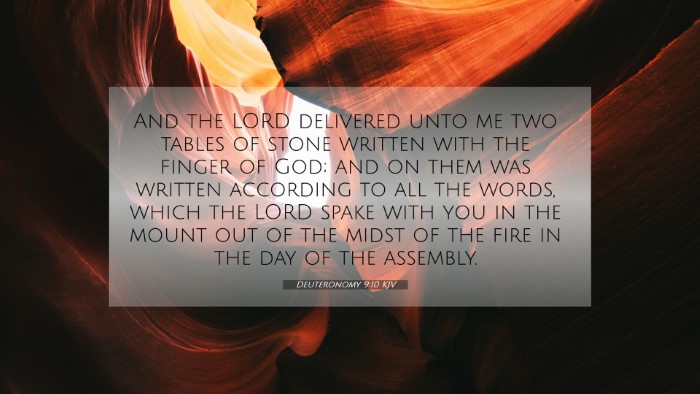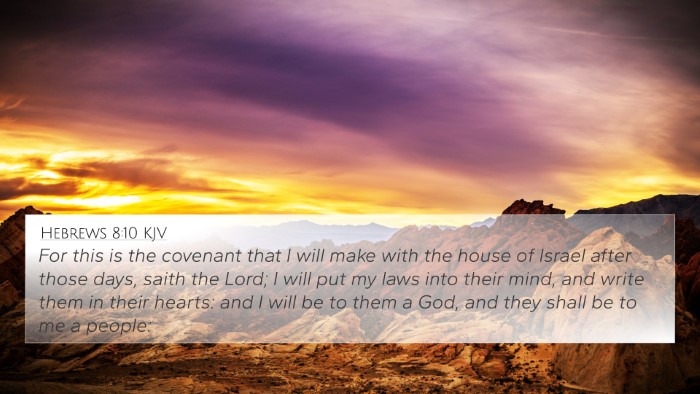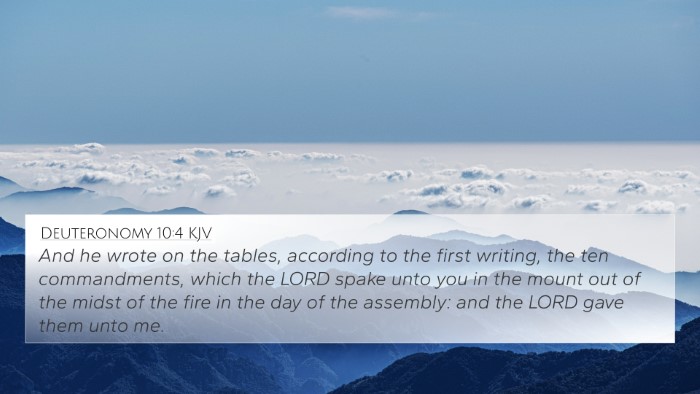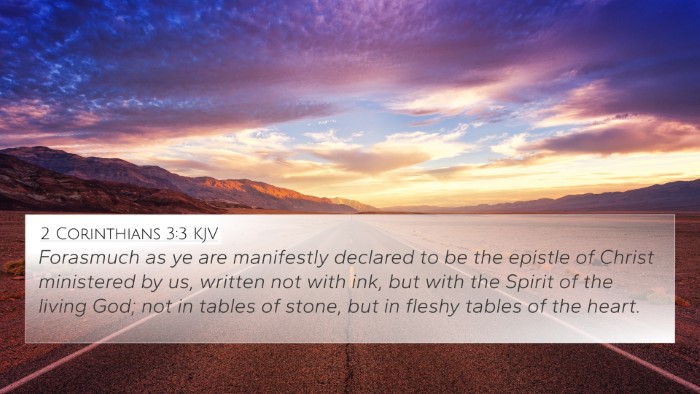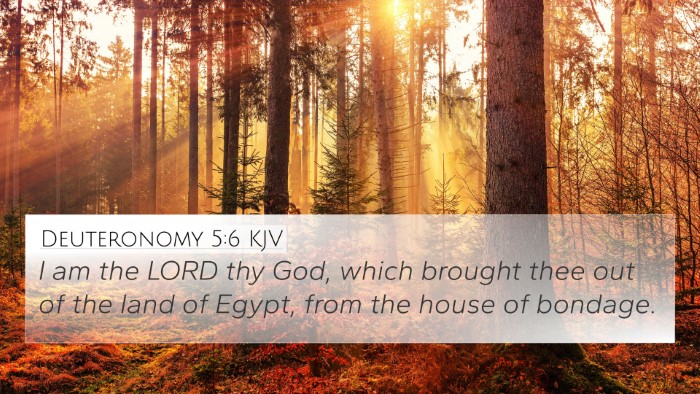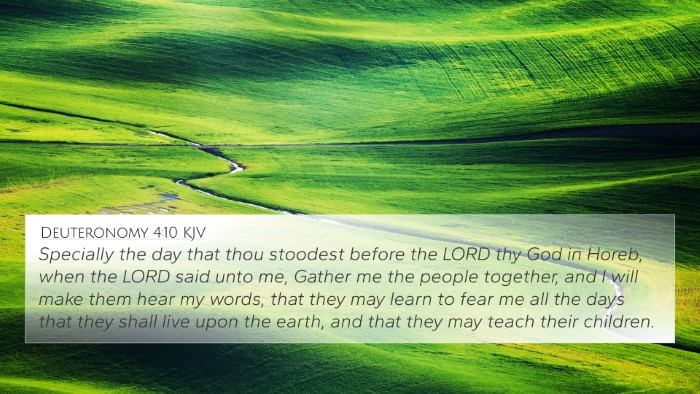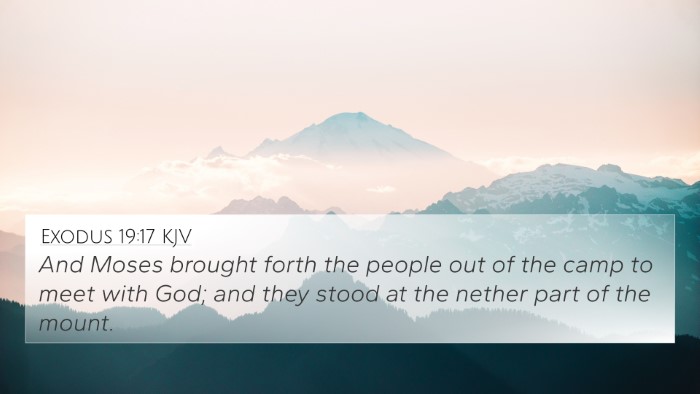Summary of Deuteronomy 9:10
Deuteronomy 9:10 states:
"And the Lord delivered unto me two tables of stone written with the finger of God; and on them was written according to all the words, which the Lord spake unto you in the mount out of the midst of the fire in the day of the assembly."
This verse emphasizes the divine origin of the law given to Moses and serves as a vital reminder of the covenant between God and His people. The tables of stone symbolize permanence and the significance of the commandments inscribed on them.
Commentary Insights
Matthew Henry Commentary:
Henry notes the miraculous nature of the stones and highlights that they were written by the "finger of God." This phrase indicates that the commandments are not merely human ideas but divinely inspired directives meant for the people of Israel. The process of receiving these commandments is a solemn occasion, recognized as part of the assembly of God's people.
Albert Barnes' Notes on the Bible:
Barnes emphasizes the authority of the law as it was given directly by God, which implies that the commands should be revered and followed. He clarifies that the phrase "written with the finger of God" signifies divine authorship and confirms the sacredness of the laws inscribed upon the stones.
Adam Clarke's Commentary:
Clarke explains that the two tables represent the moral and ceremonial laws of God. The reference to these laws being delivered to Moses underscores the idea that they are to guide the moral and spiritual lives of the Israelites throughout their generations. Clarke connects this event with other parts of Scripture, illustrating the continuous presence of God's word in history.
Key Themes and Cross-References
This verse can be connected to various other scriptures that highlight the law, its divine origin, and significance. Here are some relevant cross-references:
- Exodus 31:18: "And he gave unto Moses, when he had made an end of communing with him upon mount Sinai, two tables of testimony, tables of stone, written with the finger of God."
- Exodus 34:1: "And the Lord said unto Moses, Hew thee two tables of stone like unto the first; and I will write upon these tables the words that were in the first tables, which thou brakest."
- Deuteronomy 5:22: "These words the LORD spake unto all your assembly in the mount out of the midst of the fire, of the cloud, and of the thick darkness, with a great voice: and he added no more. And he wrote them in two tables of stone, and delivered them unto me."
- Jeremiah 31:33: "But this shall be the covenant that I will make with the house of Israel; After those days, saith the Lord, I will put my law in their inward parts, and write it in their hearts; and will be their God, and they shall be my people."
- Romans 2:15: "Which shew the work of the law written in their hearts, their conscience also bearing witness, and their thoughts the mean while accusing or else excusing one another."
- Hebrews 8:10: "For this is the covenant that I will make with the house of Israel after those days, saith the Lord; I will put my laws into their mind, and write them in their hearts: and I will be to them a God, and they shall be to me a people."
- John 1:17: "For the law was given by Moses, but grace and truth came by Jesus Christ."
- 1 John 5:3: "For this is the love of God, that we keep his commandments: and his commandments are not grievous."
Thematic Connections
This verse provides a significant foundation for understanding the relationship between God and humanity through His commandments. The themes of divine authority, moral obligation, and the covenant relationship are prevalent and serve as a recurring motif throughout Scripture:
- Divine Authority: Deuteronomy 9:10 reinforces the concept that God's laws are not optional; they are fundamental to the covenant.
- Covenant Relationship: The giving of the law signifies a formal agreement between God and Israel, which establishes their identity as His chosen people.
- Moral Responsibility: The commandments are designed to guide the behavior of the people, stressing the importance of living in accordance with God's will.
Tools for Bible Cross-Referencing
For those looking to deepen their understanding of Bible verse cross-references and how to uncover significant connections within Scripture, various tools and resources can be immensely helpful:
- Bible Concordance: An alphabetical list of words and phrases in the Bible, helping to locate specific verses and their contexts.
- Bible Cross-Reference Guide: A comprehensive tool that provides suggested connections between various scriptures based on themes and topics.
- Cross-Reference Bible Study: A methodological approach to studying the Bible by examining relationships and overlaps between verses.
- How to Use Bible Cross-References: Guides and tutorials that instruct users on effectively utilizing cross-references for in-depth studies.
- Bible Reference Resources: Additional literature and tools compiled to aid believers in navigating biblical texts.
Concluding Reflections
Deuteronomy 9:10 serves not only as a historical account of the giving of the law but also as a crucial theological reference for understanding the dynamics of the covenant between God and His people. The insights gathered from public domain commentaries underscore the importance of the law, its divine origin, and its implications for moral and spiritual life.
Through the interconnectedness of the Bible, this verse is a gateway to exploring themes of divine authority, moral responsibility, and the enduring nature of God's commandments, enriching the believer's journey through Scripture.


